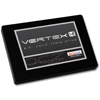- Qualcomm Launches Snapdragon 4 Gen 2 Mobile Platform
- AMD Launches Ryzen PRO 7000 Series Mobile & Desktop Platform
- Intel Launches Sleek Single-Slot Arc Pro A60 Workstation Graphics Card
- NVIDIA Announces Latest Ada Lovelace Additions: GeForce RTX 4060 Ti & RTX 4060
- Maxon Redshift With AMD Radeon GPU Rendering Support Now Available
OCZ Vertex 4 240GB SATA 6Gbit/s SSD Review

The Vertex is back, and this time it features more OCZ than ever before! (No, we’re not kidding.) Powered by its latest Everest 2 platform, the Vertex 4 is a completely in-house SSD that not only brings Indilinx back to the table, but very well has the potential to be the most reliable Vertex-branded SSD we’ve ever seen.
Page 8 – Real-World: Boot Times, Game Level Loading
For the boot test we perform a cold boot, with the stopwatch starting the moment the power button is pressed until the last systray icon has finished loading. A large number of factors can change how fast a computer starts, from the motherboard to the BIOS/EFI configuration, so these times should not be used as an expectation of how fast the SSD will boot in your respective system. Thanks to motherboards replacing the BIOS with UEFI boot times have dropped significantly in many cases.

The Vertex 4 turns in a result here about three seconds behind that of the fastest SSD. All of the SSDs are easily capable of handing a mere OS bootup, and doing so in a third of the time of our lone mechanical drive.
Game Level Loading
Last but certainly not least of our benchmarks are the game level-load times. SSDs are great at decreasing load intervals, and having an SSD can appreciably improve game immersion by minimizing load delays. It may not seem like much, but after a few levels, having the load times decrease by even a third compared to a hard drive adds up fast.
For our new regimen we chose Portal 2 and Civilization V. Portal 2 is already a very well optimized game and isn’t particularly demanding, and Civilization V is anything but either of those. For Portal 2 we chose to load the larger sp_a3_03 chapter, while with Civ V we loaded a save game file from late in a large game.

Although the Vertex 4 shows a huge lead here in Civilization V, it turns out the culprit was Steam. Upon launching our game we were greeted with a message kindly informing us Steam was adopting a more efficient, faster file package format. Fortunately for Civilization V gamers we can clearly see the new format is quite effective, however it unfortunately ruins any sort of comparison whatsoever with previous SSD results. The V4 Civ results are simply not comparable to our past SSD results.
Our results with Portal 2 are not so favorable for the V4, and are roughly three seconds behind that of the quickest time for this test. Three seconds is not major given it is still appreciably ahead of the HDD, but it was still a slight surprise.
A quick side note: As we are looking to update out benchmarking methods, if you know of a recent, favorite game that loads exceptionally slow on a hard disk drive that could benefit from an SSD, please feel free to let us know in our forums, and we just may adopt it for future testing!
Support our efforts! With ad revenue at an all-time low for written websites, we're relying more than ever on reader support to help us continue putting so much effort into this type of content. You can support us by becoming a Patron, or by using our Amazon shopping affiliate links listed through our articles. Thanks for your support!




